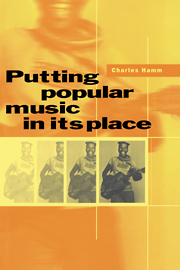Book contents
- Frontmatter
- Contents
- Acknowledgements
- Preface
- 1 Modernist narratives and popular music
- 2 Rock and the facts of life
- 3 Changing patterns in society and music: the US since World War II
- 4 “If I Were a Voice”: or, The Hutchinson Family and popular song as political and social protest
- 5 Some thoughts on the measurement of popularity in music
- 6 Elvis, a review
- 7 Home cooking and American soul in black South African popular music
- 8 Rock ‘n’ roll in a very strange society
- 9 African-American music, South Africa, and apartheid
- 10 “The constant companion of man”: Separate Development, Radio Bantu, and music
- 11 Privileging the moment of reception: music and radio in South Africa
- 12 Music and radio in the People's Republic of China
- 13 Towards a new reading of Gershwin
- 14 A blues for the ages
- 15 Graceland revisited
- 16 Dvořák in America: nationalism, racism, and national race
- 17 The last minstrel show?
- 18 The Role of Rock, a review
- 19 Genre, performance, and ideology in the early songs of Irving Berlin
- 20 Epilogue: John Cage revisited
- Index
1 - Modernist narratives and popular music
Published online by Cambridge University Press: 05 February 2012
- Frontmatter
- Contents
- Acknowledgements
- Preface
- 1 Modernist narratives and popular music
- 2 Rock and the facts of life
- 3 Changing patterns in society and music: the US since World War II
- 4 “If I Were a Voice”: or, The Hutchinson Family and popular song as political and social protest
- 5 Some thoughts on the measurement of popularity in music
- 6 Elvis, a review
- 7 Home cooking and American soul in black South African popular music
- 8 Rock ‘n’ roll in a very strange society
- 9 African-American music, South Africa, and apartheid
- 10 “The constant companion of man”: Separate Development, Radio Bantu, and music
- 11 Privileging the moment of reception: music and radio in South Africa
- 12 Music and radio in the People's Republic of China
- 13 Towards a new reading of Gershwin
- 14 A blues for the ages
- 15 Graceland revisited
- 16 Dvořák in America: nationalism, racism, and national race
- 17 The last minstrel show?
- 18 The Role of Rock, a review
- 19 Genre, performance, and ideology in the early songs of Irving Berlin
- 20 Epilogue: John Cage revisited
- Index
Summary
Popular music, as we understand the term today, was a product of the modern era, extending from the late eighteenth century through the first two-thirds of the twentieth, or from the industrial revolution through late capitalism.
The modern era brought a concentration of power in the institutions of industrialized countries and a new set of economic and social relations within the developing systems of capitalism and socialism. It was a time of the emergence of large new nation-states, swallowing up previously autonomous city-states, regions, and smaller countries; of colonialism, with a handful of European countries taking military and economic control over much of the rest of the world, and then postcolonialism, with large international conglomerates playing the same role; and of oligarchical domination within industry, finance, and both state and private institutions. In contrast, today's postmodern world is marked by fragmentation, discontinuity, ephemerality, and chaos in economics, politics, social relations, and the arts.
The intellectual and ideological climate of the modern era encouraged various writers to construct meta-narratives: broad, all-encompassing schemes purporting to yield some “special mode of representation of eternal truth.” Lyotard, who sees the modern-postmodern dialectic as a “crisis of narratives,” defines the modernist meta-narrative (in science):
To the extent that science does not restrict itself to stating useful regularities and seeks the truth, it is obliged to legitimate the rules of its own game. It then produces a discourse of legitimation with respect to its own status, a discourse called philosophy. […]
- Type
- Chapter
- Information
- Putting Popular Music in its Place , pp. 1 - 40Publisher: Cambridge University PressPrint publication year: 1995



